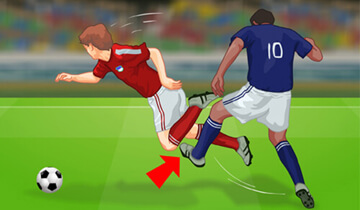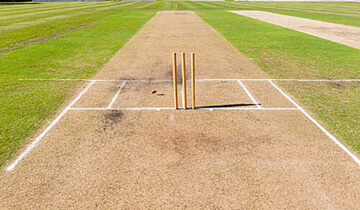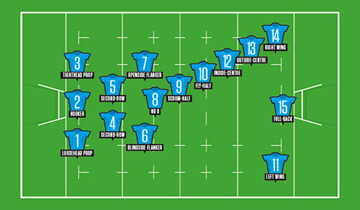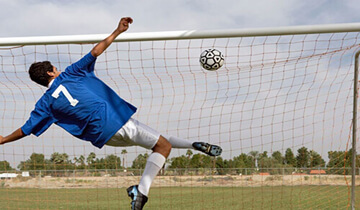Soccer is a sport filled with excitement, skill, and intense competition. However, amidst the fast-paced action, there are rules in place to ensure fair play and maintain the integrity of the game. When players violate these rules, they commit fouls, which can have significant consequences. In this article, we will delve deeper into the concept of soccer fouls and explore their various types, consequences, and the role of referees in maintaining fair play.
What is a Soccer Foul?
A soccer foul occurs when a player deliberately or inadvertently engages in an action that causes the referee to halt play. These actions can range from minor infractions like light touches or pushes to more severe offenses such as tripping, kicking, holding, hitting, or charging a player. Regardless of the specific nature of the foul, its occurrence leads to a pause in play and typically results in a free kick for the opposing team. While fouls may appear trivial, each type can significantly impact the outcome of the game.
Breaking Rules: The Concept of a Soccer Foul
The essence of a soccer foul lies in the breach of the game’s rules. These rules, encompassing both general sporting regulations and soccer-specific guidelines, are designed to ensure the smooth progression of the game while promoting fair competition and enhancing the overall soccer experience for players and fans alike. While the referee may issue a yellow or red card as a consequence of a foul, it is important to remember that soccer prioritizes fun, competition, and sportsmanship. Regardless of the game’s competitive nature, all players should strive for fair play and mutual respect on the field.
Different Types of Fouls: Handball, Offside, and Dangerous Play
Soccer fouls can be classified into different types based on the specific nature of the offense committed. Three common types of fouls include handball, offside, and dangerous play.
A handball occurs when a player deliberately handles the ball with their hands or arms. The offside rule applies when a player is ahead of the last defender at the moment the ball is passed to them. Dangerous play encompasses actions that involve excessive force, such as high foot challenges, pushing, charging, or tackling from behind. Regardless of the player’s intention, any conviction of a foul results in a penalty for the team.
Consequences of Fouls: Free and Penalty Kicks
When a team commits a soccer foul against their opponents, the referee has the authority to award a free kick or a penalty kick to the victimized team. The severity of the foul determines the referee’s decision. For instance, if a foul occurs within the penalty area, a penalty kick is warranted. This scenario presents an excellent opportunity for the opposing team to score, potentially influencing the final outcome of the soccer match. Consequently, fouls are taken very seriously, with referees remaining vigilant for any misconduct throughout the gameplay, emphasizing the entertaining and competitive nature of the sport.
Multiple Fouls: The Implications of Yellow and Red Cards
Soccer is a globally adored sport, with passionate fans ardently supporting their favorite players. However, to ensure a fair game for all participants, referees must effectively manage player behavior. In the case of multiple fouls committed by a player, referees have the authority to caution them by showing a yellow card or even exclude them from further participation in the match by issuing a red card. A red card mandates the player’s immediate removal from the field, while a yellow card serves as a warning to prevent expulsion from the game. These cards provide referees with effective disciplinary tools to address players who repeatedly commit fouls.
The Role of Referees: Ensuring Fair Play and Player Safety
Referees play a crucial role in soccer, ensuring fair play and player safety. They possess the authority to make calls during games, including identifying fouls when players break established rules. This framework helps maintain soccer as a competitive and enjoyable sport on a global scale. Moreover, referees significantly contribute to player safety on the field. From blowing the whistle to halt dangerous play to checking for illegal equipment use, referees remain constantly vigilant to ensure the protection of players from harm.
Players’ Responsibility: Avoiding Fouls for Competitive Advantage
While physical contact is inevitable in the fast-paced and physical nature of soccer, players should strive to play hard without committing fouls. Intentionally engaging in aggressive tackles or other moves that violate the game’s laws not only risks receiving disciplinary action from officials but also grants opponents an advantage. By avoiding fouls, soccer players can ensure that they and their team remain competitive throughout the match, without compromising their chances of success.
Conclusion: The Importance of Fair Play in Soccer
Soccer is a physically demanding and highly rewarding sport that places great emphasis on fair play. It is essential for players to understand and adhere to the rules to avoid committing fouls that can be avoided and prove costly for their team. By embracing fair play, players contribute to a positive and enjoyable soccer experience for themselves, their teammates, and their opponents. So, the next time you step onto the soccer field, remember these rules to not only stay on the pitch but also to aid your team in securing a well-deserved victory.







































